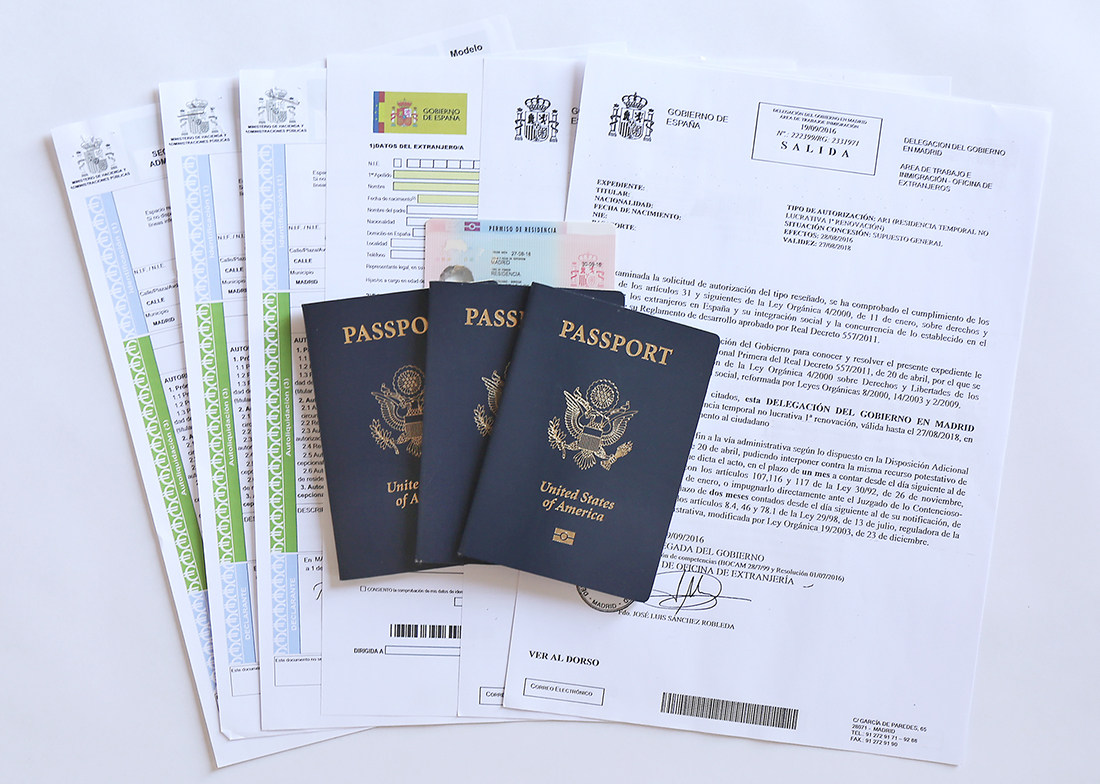
Todd and Liesl Gibson with their daughter during their move to Spain.
Photos by Todd Gibson
Two years ago, my wife and I took our business from the United States to Spain. Although I can’t provide you with a checklist for your own international move, I can highlight some issues that you should address as you plan your relocation. I’m assuming here that you’re a United States citizen and that you’re currently living and working in the US (although many of these suggestions will be appropriate for non-US citizens as well).
Preparing Your Business’s Operations to Continue While You’re Abroad
Before relocating to another country, you’ll need to make sure your business can operate without disruption for your customers. Six months to a year before you move, you should begin building a virtual presence in the US that will stay behind after you leave.
If the majority of your customers are in North America and you’re not, the most important operational issue to resolve is how you will fulfill orders. If you’re selling physical product, you’ll probably want to enter into a relationship with a fulfillment center. Make sure you have that in place and that it’s working well for several months before you leave.
You may want to keep a US phone number and a US mailing address for your business. Google will lead you to several US-based mail forwarding and phone forwarding services. Find one of each that meets your requirements and get your accounts set up while you’re still in the US. File any necessary change of address paperwork (e.g., US Postal Service, IRS, state authorities, etc.) well before your move date.
You’ll probably want to send your tools, supplies, and maybe even some inventory to your new location. Make sure you understand the customs and import laws of your new country before shipping so that you’re not surprised with a huge tax bill when your property arrives. There may be customs exemptions available to you if you file paperwork before sending your shipment. In some cases, you may find that it’s less expensive to replace things than it is to ship them.


Evaluating Your Business’s Structure
Use the move as an opportunity to evaluate your business structure and possibly make changes to it. These are questions you should be asking many months before your move date so you have time to file any necessary paperwork before you go. The first thing you’ll need to think about is how you’ll conduct business in your new home. That will depend, in some part, on how you conduct business now and the type of residence status you’ll have in your new country. Here are some questions to ask yourself:
- Do you currently work as a self-employed individual, or are you incorporated?
- Does your visa status in your new country allow you to work there?
- If you’re self-employed, are you allowed to continue working that way in your new country?
- If you’re incorporated in the US, how does your new country view living there but being employed by a company that is not incorporated there?
The answers to these questions will drive decisions you’ll make about your business structure. Don’t wait to ask these questions until after you arrive in your new home. Understand the answers to them well in advance of your move.
Let’s assume you’re incorporated in the US and you’re an employee and owner of your business. You’ll want to ask yourself more in-depth questions about your business:
- Will you keep the business incorporated in the US, or will you close your US business and reincorporate in your new home country?
- Will you keep your US business and incorporate a new one (perhaps as a subsidiary) in your new country? Which company will pay you—and in which country? How will you account for any profits the business makes?
- If you will no longer maintain a residence in the US state in which you are now incorporated, would it make sense for you to change your state of incorporation to a state with lower corporate taxes or fees once you move?

How your business is structured, the tax treaty between the US and your new home country (if there is one), and how you are paid can have major impacts on your business and personal tax liabilities. Make sure you understand this early. Get advice about your obligations to the US government, and to the government of your new home country, from a tax attorney or an accountant prior to your move. You may find that if you structure your business differently and/or pay yourself differently you’ll be able to optimize your tax situation.
You’ll also need to think about your relationships with any employees you have and freelancers you use. Will your financial obligations to them need to change if you move to a different country or if you change the structure of your business to support your move? You may find you need to make changes here as well.
And don’t forget about health insurance. Most US policies don’t provide coverage if you are outside the country. You’ll need to look into getting a policy in your new country of residence, or a specific ex-pat plan offered by an American company.
There are many, many more logistical issues you’ll face when you move internationally. But planning early to maintain a virtual presence in the US and to ensure your business is structured correctly will help make the move itself, and its aftermath, a little less stressful for you.

Todd Gibson
contributor
Todd is managing partner of Liesl + Co., makers of the Oliver + S, Lisette, Straight Stitch Society, and Liesl + Co. brands of sewing patterns. Prior to joining his wife in the business she founded, Todd worked for over a decade as a management consultant and a member of the strategic planning and analysis team at a global investment bank. He is the author of “A Guide to Strategic Planning” published by the FabShop Network and was featured in the Creativebug series “Building a Creative Brand.”

I had the opposite problem of moving back to my home country, Australia, and having to set up my business properly from scratch. It’s not a “fun” part of moving internationally (although most of the logistics of such a move aren’t!), but it’s definitely an important part.